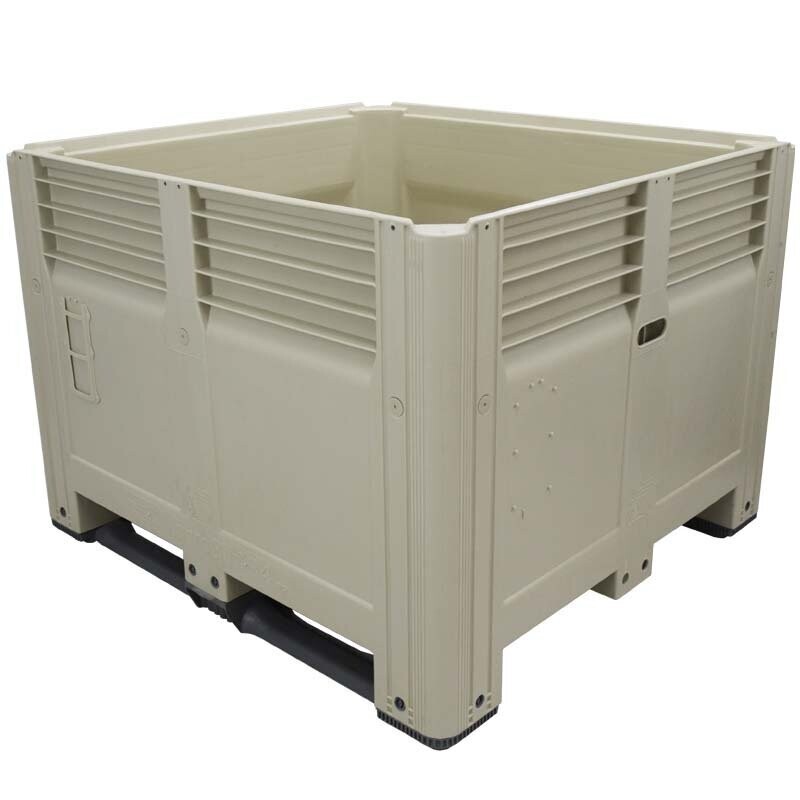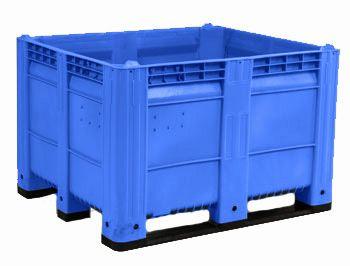The Duty of Bulk Plastic Containers in Effective Recycling Practices and Sustainability
Bulk plastic containers are integral to modern reusing initiatives. Their layout enhances the performance of material collection and transportation, contributing to sustainability objectives. These containers not only maximize room yet additionally assist in checking contamination levels. Their application is not without difficulties. Comprehending the full range of their impact reveals a complicated partnership in between logistics and environmental duty that warrants more exploration.
Understanding Mass Plastic Containers
Bulk plastic containers function as an essential element in numerous markets, helping with the storage and transportation of goods. These containers are usually made from durable materials such as high-density polyethylene (HDPE) or polypropylene, which provide sturdiness and resistance to ecological aspects. Their design often consists of functions like stackability and modularity, allowing for reliable use room throughout both storage and transportation.
Industries such as farming, food processing, and making frequently make use of mass plastic containers as a result of their light-weight nature and simplicity of handling. The containers are available in numerous sizes and arrangements, dealing with the details needs of different items. Their versatility expands past simple capability; they can additionally be tailored with covers, deals with, and labeling choices to enhance use - plastic bulk containers. Consequently, bulk plastic containers play a crucial duty in optimizing logistics and supply chain procedures throughout several sectors, thus adding to general efficiency and cost-effectiveness
Benefits of Utilizing Mass Plastic Containers in Recycling
When companies focus on reusing initiatives, the application of bulk plastic containers considerably boosts the effectiveness of the procedure. These containers are developed to optimize room, permitting the storage space and transport of bigger amounts of recyclable products. This leads to fewer journeys to recycling facilities, consequently reducing fuel intake and connected emissions.
Furthermore, mass plastic containers are sturdy and resistant to numerous environmental aspects, ensuring that products continue to be shielded throughout handling and transportation. Their light-weight layout better adds to reduce transport prices.
The harmony of these containers promotes much better sorting and handling of recyclable products, which can improve total recycling rates. Organizations that embrace bulk plastic containers likewise show a dedication to sustainability, positively affecting their brand image. Ultimately, these advantages not only streamline reusing techniques yet likewise add to wider environmental goals
Just How Mass Plastic Containers Facilitate Product Collection
Efficient material collection is significantly improved by the usage of bulk plastic containers, as they provide a structured and reliable solution for collecting recyclable products. These containers are developed to suit big volumes of materials, which streamlines the sorting and storage procedure. Their stackable layout makes the most of room application, making it less complicated for facilities to organize recyclables without clutter.
In addition, mass plastic containers are weather-resistant and sturdy, allowing for outdoor placement without destruction. This resilience assures that materials stay secured until they are collected for processing.

The uniformity in shapes and size of these containers helps with standardization throughout collection points, enabling better tracking of recyclable quantities. Their clear nature allows for very easy visibility of contents, helping in the tracking of contamination levels and guaranteeing that only suitable materials are gathered. Generally, mass plastic containers play an essential duty in simplifying the material collection process, thus promoting reliable reusing practices.
Transport Efficiency and Environmental Effect
Transport efficiency plays a crucial function in the reusing process, particularly through the optimization of tons capability in mass plastic containers. By making best use of the quantity of product transported, firms can substantially lower the variety of journeys needed, thereby decreasing their carbon impact. This strategy not just enhances functional efficiency however additionally contributes to a lot more sustainable environmental methods.

Maximizing Lots Ability
Enhancing load capacity is commonly forgotten, it plays a necessary duty in enhancing transportation effectiveness and lessening ecological effect in reusing techniques. By optimizing the quantity that bulk plastic containers can hold, reusing procedures can minimize the variety of trips needed for transportation. This not only lowers fuel intake but also reduces the damage on cars. Reliable tons administration enables facilities to use room successfully, ensuring that each transportation cycle is as efficient as possible. Additionally, well-optimized tons can result in far better arrangements with logistics providers, possibly reducing total prices. Eventually, improving load capability contributes to a much more lasting reusing system by cultivating efficient source usage and decreasing waste generated during transport.
Reducing Carbon Footprint
As reusing procedures undertaking to minimize their environmental impact, minimizing the carbon footprint related to transport becomes an important objective. Mass plastic containers play an important function in achieving this objective by improving tons performance and maximizing logistics. Their lightweight yet long lasting style enables maximum cargo space usage, reducing the number of trips called for to carry materials. By combining shipments, reusing centers can lower fuel usage and greenhouse gas emissions. In addition, tactically situating recycling centers minimizes transportation distances, furthermore lowering carbon outputs. Additionally, using fuel-efficient automobiles and alternate energy resources improves general sustainability. By incorporating these methods, the recycling industry can substantially diminish its carbon footprint, adding to a much more lasting future.
Difficulties in using Mass Plastic Containers

Contamination Problems
Contamination problems represent a substantial challenge in the reliable use bulk plastic containers within recycling techniques. These containers often collect deposits from previous materials, resulting in blended products that can prevent the reusing process. Contaminants such as food waste, chemicals, or non-recyclable materials can jeopardize the integrity of the whole set, leading to increased disposal costs and lowered recycling prices. Furthermore, incorrect cleansing or sorting can aggravate these concerns, making it difficult for reusing centers to process materials successfully. The presence of contaminants not only impacts the top quality of recycled products but likewise threatens the overall sustainability initiatives targeted at minimizing plastic waste. Attending to these contamination challenges is crucial for boosting the effectiveness Look At This of mass plastic container recycling.
Recycling Framework Limitations
Ineffectiveness in reusing infrastructure presents significant obstacles for the effective administration of mass plastic containers. Many recycling facilities lack the capability to process large volumes of these containers effectively, leading to increased hold-ups and prices. Moreover, inadequate arranging modern technologies usually result in contamination, as mass containers may be combined with various other materials, making complex the recycling procedure. Restricted transport options likewise impede the movement of bulk plastic containers to proper reusing facilities, resulting in increased garbage dump waste. Furthermore, a lack Home Page of standard methods for mass container recycling develops confusion among businesses and consumers, better making complex initiatives to advertise sustainability. Dealing with these framework restrictions is necessary to improve reusing practices and take full advantage of the capacity of bulk plastic containers in a circular economic climate.
Best Practices for Applying Bulk Plastic Containers
When companies consider executing bulk plastic containers in their reusing practices, they should focus on a critical method that improves effectiveness and reduces contamination threats. Initially, picking the appropriate container size and type is vital to suit the quantity of materials being refined. Organizations must likewise develop clear labeling and signage to lead users on correct disposal approaches, lessening complication and errors. Routine training sessions for personnel can further reinforce these practices, guaranteeing everybody recognizes their roles in preserving reusing integrity.
Additionally, companies should execute a routine upkeep timetable to inspect and tidy containers, stopping the build-up of pollutants. Partnering with neighborhood reusing facilities can also simplify the collection process, making sure that materials are efficiently processed. Finally, companies ought to keep an eye on and evaluate their recycling metrics, utilizing this information to refine methods with time and promote constant improvement in their sustainability efforts.
The Future of Mass Plastic Containers in Lasting Practices
As companies significantly prioritize sustainability, the duty of mass plastic containers in reusing practices is set to progress significantly. Innovations in products science are leading to the advancement of biodegradable and recyclable choices, improving the environmental benefits of bulk plastic containers. On top of that, the implementation of closed-loop systems will permit much easier collection and repurposing of these containers, decreasing waste and resource consumption.
Technological developments, this content such as smart tracking systems, will certainly enable companies to check the lifecycle of bulk containers, enhancing effectiveness in recycling processes. As consumer demand for sustainable practices expands, services will likely adopt mass plastic containers created for reuse and long-term worth. Moreover, collaboration in between industries and governments will cultivate the facility of standardized reusing procedures, guaranteeing that mass containers are efficiently integrated right into wider sustainability campaigns. Overall, the future of bulk plastic containers appears promising, with substantial possibility for adding to a round economic situation.
Often Asked Inquiries
Just How Are Mass Plastic Containers Made and What Products Are Made use of?
Bulk plastic containers are usually made from high-density polyethylene (HDPE) or polypropylene (PP) These products are refined with shot molding or impact molding methods, resulting in sturdy, light-weight containers ideal for various storage space and transport demands.
Can Mass Plastic Containers Be Recycled Several Times Before Recycling?
Yes, bulk plastic containers can be reused several times prior to recycling. Their toughness and style enable duplicated use in various applications, promoting sustainability and source performance while reducing the demand for new containers.

What Certifications Exist for Mass Plastic Containers in Recycling?
Numerous qualifications for bulk plastic containers include the Recycling Partnership's accreditation, the Cradle to Cradle Licensed ™ requirement, and the Sustainable Product packaging Coalition's standards, making sure containers fulfill particular ecological and recyclability standards for efficient recycling.
How Do Bulk Plastic Containers Contrast to Other Recycling Storage Options?
Bulk plastic containers use higher sturdiness and capacity contrasted to various other recycling storage space choices, decreasing the threat of contamination and facilitating effective transportation. Their design sustains better company, boosting total performance in recycling procedures.
What Is the Lifespan of a Mass Plastic Container in Recycling Processes?
The lifespan of a bulk plastic container in recycling processes usually varies from 5 to ten years, depending on use, material high quality, and ecological conditions, permitting several cycles of usage before eventual disposal or recycling.
When organizations prioritize recycling efforts, the utilization of mass plastic containers significantly enhances the efficiency of the procedure. Transport effectiveness plays a crucial function in the recycling process, particularly with the optimization of tons capability in mass plastic containers. The use of bulk plastic containers in recycling practices faces considerable difficulties, especially concerning contamination problems and constraints within reusing framework. Contamination concerns represent a substantial difficulty in the efficient usage of bulk plastic containers within reusing techniques. When companies take into consideration carrying out mass plastic containers in their reusing techniques, they need to focus on a calculated approach that enhances performance and decreases contamination risks.